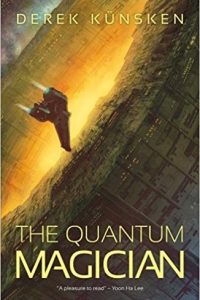Roundtable: SF Aesthetics
I watched the documentary that Damien’s discussing there, which struck me as a charming and sincere (but somewhat strained) attempt to bridge the Two Cultures thing, if only at a very basic level of aesthetics.
But I think this argument in general has been done to death, and there’s never going to be a satisfactory answer. For one thing, we can’t all agree on a definition of science fiction that sticks; for another, even if we could define sf successfully, it wouldn’t be (or at least I hope not) sufficiently homogeneous to assess with a single (and equally vague) aesthetic criterion. There’s no neat cleavage point; tap the crystal of genre at the point Damien’s talking about, and it just shatters into lots of tiny fragments.
I guess I’m holding to my Quantity Theory Of Genre, here; Damien’s talking about one of many qualities that some of the fuzzy set of books labeled sf partake in (and, to be honest, it’s one of the qualities I look for when picking things to read), but – even if it’s not meant as such – it still boils down to “my sf good, your sf not so good”. And that argument, so far as I can tell, has been going since long before ’55!
A more interesting question would be to ask whether fiction that partakes in sf can produce that “internal experience” of the world in a way that fiction that doesn’t partake in sf cannot achieve. The answer is intuitively “yes”, but I suspect reaching an agreement on how and why that is the case would be a rather longer discussion… and more productive than another round of “where do we draw the fence between the crap stuff and the good stuff”.
Beauty is subjective and objective at once, and trying to define it universally is a fruitless effort; understanding how and why beauty arises from our interaction with the universe and the things within it is probably one of the greatest civilisational goals we could aspire to. But you may want to take this with a large pinch of salt, because I have been re-reading Zen & The Art Of Motorcycle Maintenance again recently, and it has a very long-lasting and pervasive influence on my philosophy of aesthetics…
My two cents, anyhow. Attack my opinion with sharp things!








Pingback:New Year Linkdump | Cora Buhlert
Pingback:Cheryl's Mewsings » Blog Archive » At Locus, We Talk
The ‘beauty’ that Dirac referred to includes an element of ‘getting the job done’. In that respect, any story that gets the job done for the reader contains that element of ‘beauty’.
As at least a couple of the contributors mentioned, this is really nothing more than an exercise in goal post moving. Rather than discussing “what is science fiction”, we’re asking if there is “beauty” to be found in it. A question that will never be answered as we are all looking at different sections of the tapestry.
For me, personally, those elements of writing that are (erroneously) attributed to “literary merit” CAN be incorporated into works of science fiction but do not have to be present to produce a beautiful story. (Cold Equations anyone? Where’s the “depth of character” in that classic?)
Damien lost me, however, with one of his opening paragraphs:
“I strongly object to the idea that science fiction has to be about science.”
For me there is a line, however squishy or nebulous. The absence of science that informs the story, or serves as background or provides the central element removes a story from the ranks. Even stories that ‘act’ like science fiction but that do not have the practices, logical projection/speculation based on science are over that line (the case for many so-called literary works that incorporate elements of SF, but that do not derive from an SF history/community/sensibility/whatever).
I view this as yet another argument “against” science fiction, seeming to come from someone who buys in to the Vonnegut epithet.
Pingback:The Great Geek Manual » Geek Media Round-Up: January 3, 2011
I’m reminded of the remarks of former world chess champion Emmanuel Lasker contrasting his views of beauty in chess with those of title contender Siegbert Tarrasch.
“Dr. Tarrasch is a thinker, fond of deep and complex speculation. He will accept the efficacy and usefulness of a move if at the same time he considers it beautiful and theoretically right. But I accept that sort of beauty only if and when it happens to be useful. He admires an idea for its depth, I admire it for its efficacy. My opponent believes in beauty, I believe in strength. I think that by being strong, a move is beautiful too. – Emanuel Lasker”
In other words, I agree with the previous commenter regarding “getting the job done.” Are the paintings of Hieronymus Bosch beautiful? Deep? I’d say no to both. But they get his points across. The same is true of many highly regarded works in other media.
Pingback:Locus Round Table Group « Damien G. Walter
Pingback:Geek Media Round-Up: January 4, 2011 – Grasping for the Wind
Pingback:The Habitation of the Linked « Torque Control
Pingback:The Skiffy and Fanty Show #2.2a — The Beauty of SF and Her Sisters (or “How to Ask SF on a Date”)(Part One) « The Skiffy and Fanty Show
Pingback:The Skiffy and Fanty Show #2.2b — The Beauty of SF and Her Sisters (Part Two) « The Skiffy and Fanty Show
Pingback:Science fiction’s future-flinch | Velcro City Tourist Board